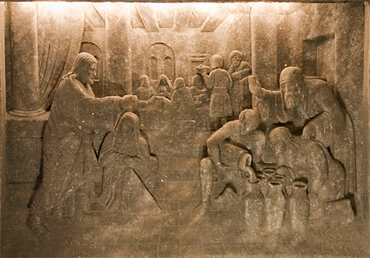Spiegazione di Giovanni 2:4
द्वारा Brian David (मशीन अनुवादित Italiano)

Questo è un versetto dal suono strano, poiché Gesù sembra rivolgersi a sua madre in modo approssimativo e un po' sprezzante. Sembra anche che stia spazzolando via la mancanza di vino come un problema di qualcun altro. Entrambe le impressioni sono apparentemente fuorvianti, però, anche nel significato letterale della storia. Maria non deve essere stata scoraggiata; immediatamente diede istruzioni ai servi di fare qualsiasi cosa Gesù avesse detto loro di fare. E invece di fare spallucce per la mancanza di vino, Gesù si mise subito a fare il suo primo miracolo.
Comunque sia, il significato spirituale offre qualcosa di molto più profondo.
Le nozze di Cana rappresentano una buona chiesa ricettiva tra i gentili. La mancanza di vino significa che la chiesa manca di una vera comprensione delle cose spirituali. Gesù rappresenta la bontà divina del Signore, e sua madre - che rappresenta la vera chiesa del Signore sulla terra - ha notato la mancanza.
Ma l'identità della vera chiesa del Signore sta cambiando; il Signore è nato come Gesù per porre fine alla chiesa ebraica in quel ruolo e lanciare la chiesa cristiana. "Donna" rappresenta semplicemente una chiesa; quando Gesù la chiama così indica che in senso spirituale non ha una chiesa madre. Egli è lì per iniziare una nuova chiesa madre.
"Ora" rappresenta uno stato spirituale, e "venire" significa un'unione di stati spirituali. Così quando Gesù dice "la mia ora non è ancora venuta", significa che il suo stato spirituale non è ancora stato introdotto nella chiesa tra i gentili.
Complessivamente, quindi, questo versetto rappresenta un punto di transizione. Il Signore ha usato la chiesa ebraica per circa 2.000 anni per conservare i significati spirituali, anche se la gente nella chiesa non lo sapeva e non era particolarmente spirituale. Ma è arrivato il momento di cambiare. La nuova chiesa non è ancora iniziata - non ha vino - ma la chiesa ebraica ha perso il suo posto - non è più "madre", ma semplicemente "donna".
Arcana Coelestia #3728
3728. 'And poured oil on the top of it' means holy good [in which it originated]. This is clear from the meaning of 'oil' as the celestial element of love, which is good, dealt with in 886, 3009, and from the meaning of 'the top' as that which is higher, or what amounts to the same, that which is interior - good being that which is higher or interior, and truth that which is lower or exterior, as has been shown in many places. From this one may see what was meant by the ancient practice when people poured oil on the top of a pillar, namely that truth should not be devoid of good but should be grounded in good, thus that good should rule, like the head on top of the body. For truth devoid of good is not truth but is a meaningless sound and the kind of thing that is reduced to nothing. In the next life it is so reduced even with those whose knowledge of truth or matters of doctrine concerning faith, and with those whose knowledge of matters of doctrine concerning love, has been superior to anybody else's, if they have not led a good life and so have not out of a desire for good held on to truth.
[2] Consequently the Church is not the Church by virtue of truth separated from good, nor therefore by virtue of faith separated from charity, but by virtue of truth that is grounded in good, or faith that is grounded in charity. The same is also meant by what the Lord said to Jacob,
I am the God of Bethel, where you anointed a pillar, where you made a vow to Me. Genesis 31:13
Also,
Jacob again set up a pillar, a stone pillar, and poured out a drink-offering over it, and poured oil over it. Genesis 35:14.
'Pouring out a drink-offering over the pillar' means the Divine good of faith, and 'pouring oil over it' the Divine good of love. Anyone may see that unless it meant something celestial and spiritual, pouring oil over a stone would be a ridiculous and idolatrous action.






